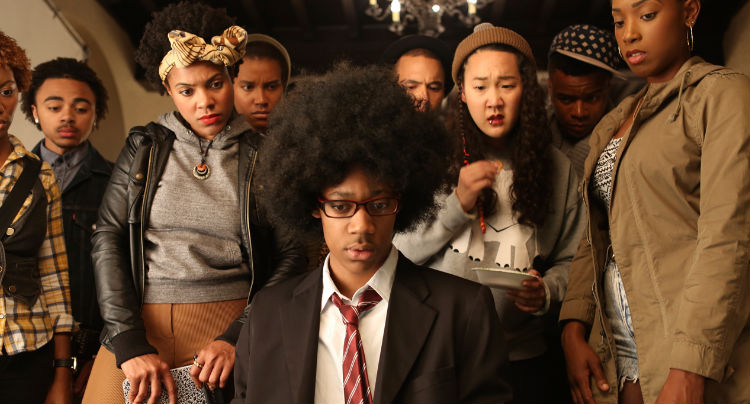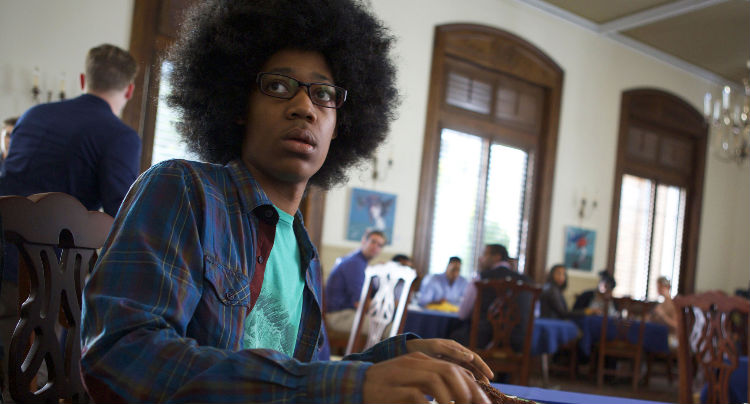Justin Simien: I Don’t Need to be Told Racism is Bad–I’m More Interested in Talking About Identity

First-time filmmaker Justin Simien’s satirical comedy Dear White People follows four black students at a fictitious Ivy League school as they struggle with identity and self-worth. Lionel Higgins (Tyler James Williams) is a shy, gay journalist who fits in nowhere; Troy Fairbanks (Brandon P Bell) is a student body golden boy and son of the dean; Sam White (Tessa Thompson) is a militant activist empowered by her blackness; and Colandrea “Coco” Conners (Teyonah Parris) has dreams of reality-TV stardom. Their journeys to define themselves clash and intertwine as the film builds to its harrowing climax, a black-themed party thrown by white students.
While in San Francisco promoting the film, we caught up with Justin along with a pair of other journalists in a roundtable chat, in which we discuss how the film would have been received 10 years ago; making a film about identity, not race; how our history directly affects our lives today; turning the film into a TV show; getting more people of color on movie screens, and much more.
Dear White People is out now in select cities and opens wider this Friday.

Sam is a very strong character, while Coco could be seen as a weaker character.
Justin: I think they’re both flip-sides of the same coin. I think they’re both using their identity to maximize their potential on campus, but they just have different identities and ideas of what it means to be authentically black. I think both of their identities come into self-scrutiny, and they both feel conflicted about the identity they put forth. They’re playing the same game, but on different sides. I see them as counterpoints to each other in an interesting way. I thought there were more subtle issues with colorism at play, and I think there’s a nice balance. They’re both flawed, they’re both right sometimes, and they’re both wrong sometimes. But because of their coded positions in this community, they’re sort of opposed to each other, which I thought was very interesting.
How do you think a movie like this would have been received if you released it 10 or 15 years ago?
Justin: I don’t know if that’s where the conversation was 10 or 15 years ago. The funny thing is, I started writing it about 8 years ago. It’s so interesting, because particularly in 2005-2006 when I started writing, we were in that post-racial bubble where mainstream media was like, “Why talk about race at all? We’re good! We have famous black people. We’re fine!” But the experience of being black didn’t feel totally resolved. It was the dichotomy of being in a place that touts its diversity and touts its accomplishments, and while they have a point, it’s also negating the experiences of a lot of people. It was that sort of unease that [was the impetus for the movie].
But that unease had yet to reach a critical mass. There weren’t reports of blackface parties every other week, and there wasn’t the New York Times faux pas with Shonda Rhimes. [There wasn’t] Bill O’Reilly fighting with Jon Stewart over the meaning of white privilege, or tragedies like Ferguson. Those things weren’t in the zeitgeist 10 years ago. It’s hard to say. It feels like this is the preordained time for the movie to come out, even though, to be honest, none of that was planned. That’s just how long it took to make [the movie]. With Do The Right Thing, which was 25 years ago, that’s what needed to be said then.
And frankly, to be honest with you, it still needs to be said. The fact that people aren’t still talking about the parallels of that movie and where we’re at currently…I mean, it’s a movie about [the fact that] the death of an unarmed black man at the hands of white police officers can happen in a community where no one is actively trying to kill somebody or harm somebody, but this thing happened. That would be a much more productive conversation than the way it sometimes is framed.
You’ve said that you didn’t want the film to be an encapsulation of what it means to be black, or be dogmatic, or have all the answers. How strategic do you have to be to make sure people know it’s not that kind of movie?
Justin: I think people are going to think it’s that movie, especially when they come into it. The feeling I get from Q&A’s is that most people realize what it is once they’re seeing it. There are some people clinging to the idea that this movie is trying to tell you something, like how America should be or how you should behave. I kind of have no control over that piece of it, but with the experience of the movie itself, I try to make creative decisions, narrative decisions, performance choices, based on what I think the movie is actually about, which is identity itself, rather than race politics. Race politics is in the world of the story–it’s the body of the film. But the soul of the film is something a bit deeper.
That’s as strategic as I could be with it, always focusing out what it was I was trying to say versus what the characters were trying to say. It was important for me to draw a distinction between that. Just because Sam argues something in the film doesn’t mean that’s necessarily what I’m arguing for. She’s saying that because in the moment that’s what she would say. The fact that it’s a satire allows you a little bit of distance so that you can think about why they did [things] and not so pulled into a moral or overarching lesson that wraps everything up neatly with a bow on it.
There’s a strong theme of nepotism in the film. Why did you feel it was important to add that element?
Justin: I think the generation before us had such an impact on where we’re at now. Bill O’Reilly and Jon Stewart were arguing about white privilege the day before yesterday on The Daily Show, and part of the argument was that, well, we’re not there now. It was a denial of the fact that the history of the country has an effect on where we’re at now. Troy is a character who’s living in the shadow of his father and living in the orders and steps presented to him by his father. Kurt is a person who didn’t have to do that. They’re both just as smart and come out just as well-off, but Troy is still held back because of the fights he and his father had to face. Kurt is not. The idea that our experience in the present is absolutely linked to what happened in the past–who our parents were, what neighborhoods we were raised in, what struggles we had to fight–I thought that was really important to talk about. Nepotism is a natural part of that.
[The idea that] affirmative action is this thing that gives African-American men and women an unfair advantage is bullshit, because everyone who’s not in that group has another advantage. Their parents and people who look like them are in control! [laughs] They have their own form of it. The idea is that affirmative action is perhaps flawed, but it’s at least a way to counteract an existing force. Sometimes the existing force is completely overlooked or ignored because no one wants to feel that the privileges in this life weren’t personally earned.
Has the movie changed to you the more you watch it?
Justin: I think the parallels between it and what’s happening now in society…I couldn’t have predicted that. It’s saying interesting things about that that I didn’t necessarily try to say or expect to say. If I made the movie today, I would emphasize over other things, just because my experiences have changed and have further informed me as a storyteller. I’d say yes, the context of the film has changed a bit, and not in a good or bad way. But it shifted just a little bit. It makes me very interested in the idea of going back in say, like, a television series and continue to tell the story as it evolves. It’s made that idea more interesting to me.

Back when the Michael Richards thing happened, Paul Mooney said it was a good thing, because it allowed us to have an important conversation. Your film has the same effect, compelling and encouraging people to have conversations. Do you think you’ll inspire other filmmakers to follow suit?
Justin: I hope so. I really do. And not just about the message of race, which needs to be talked about and dealt with, but the idea of arthouse and the specialty division of films in the marketplace having more stories about people from different points of view. It’s a little irritating–Awards time comes, and you get the white male perspective on America, the one historic black movie, and the one female-driven movie. There’s so much missing, and in terms of film, that’s the sweet spot, you know? Those specialty films, those niche films, those arthouse films that are talking about America in an interesting way. The fact that that’s where all the great conversations are happening, but there are too few people of color, or too few women, or too few gay voices in that conversation…I don’t like that. If in any way my film can allow a few more things through the gates of Hollywood, I as an audience member will be very happy for that.
You’d said something earlier about a TV series. Have you thought of pitching the film as a pilot at first?
Justin: I wrote it as a pilot. It started as a feature, then I tried it as a pilot…I mean, to be honest with you, TV wasn’t then what it is now. TV has become more cinematic, and you can tell an unconventional story in 13 parts as opposed to an episodic story. I think multi-protagonist stories lend themselves to being episodic. In the TV landscape of today, I could actually tell the story in the same way I would as if it were a movie, but I could take a lot longer with it and have more characters and really go in.
You mentioned how people of color aren’t really mentioned in movies, but with shows like Blackish, Fresh Off the Boat, and Selfie, there are all these people of color on TV. Do you think movies will catch up?
Justin: I think TV is definitely doing it sooner because there’s more money at stake. There are so many options on television, and they’ve had to answer very specifically to all this research that’s finally come out that says, you know, “The cast of your show doesn’t even look like the audience that’s watching your show!” I think some people are catching up to that. Films take a lot longer to make, there are fewer of them, and there’s less room for experimentation in film financing at the studio level and increasingly at the independent financing level. There’s less patience with putting money into something that may or may not work. With television, that’s certainly still the case, but the turnaround is a lot quicker. You’re able to see immediately what works and what doesn’t. With film, if there’s one black movie that comes out and it does poorly, you’ll never get that kind of black movie again.
I saw a movie about racial dynamics recently that was very dogmatic seemed to have all the definitive answers when it came to race relations. Is there a problem with movies like that? We see a lot of them.
Justin: It just depends on what your intention is. I don’t need to be told that racism is bad. I got it. I know it’s bad. Most people know it’s bad. For me to make a movie that, at the core of it, the theme is that racism is bad…I don’t have any interest in saying that. I’m just repeating something that we all already know, and if you don’t know, I don’t think we could even have a conversation at all, let alone me make a movie that you’d want to see. I wasn’t interested in saying that. I was more interested in talking about identity itself. That to me is something we don’t talk about in the context of race a lot, and it’s a lot more nuanced than “racism is wrong”. There’s a lot more to it. For every point there’s a counterpoint that, honestly, from the white point of view could be just as valid. It’s complicated. I’m just more drawn to those kind of stories.
When I see films, particularly about race, that are obvious and dogmatic, it doesn’t leave me with anything to talk about in the lobby. It just tells me what I already knew. I think the point of art is to hold a mirror up so that we can see ourselves in a slightly different way. I just can’t get it up for anything other than stories that do that.
Is there a particular reason Sam’s last name is White?
Justin: All of the characters have character names. Even Lionel Higgins, Coco, Troy Fairbanks…I’m saying something with all of their names. I’ll say that. In my head, it plays into the idea that this is a heightened reality, it’s a satirical space, these are archetypal characters and we only really discover their humanity the longer we watch the film. That was intentional.
